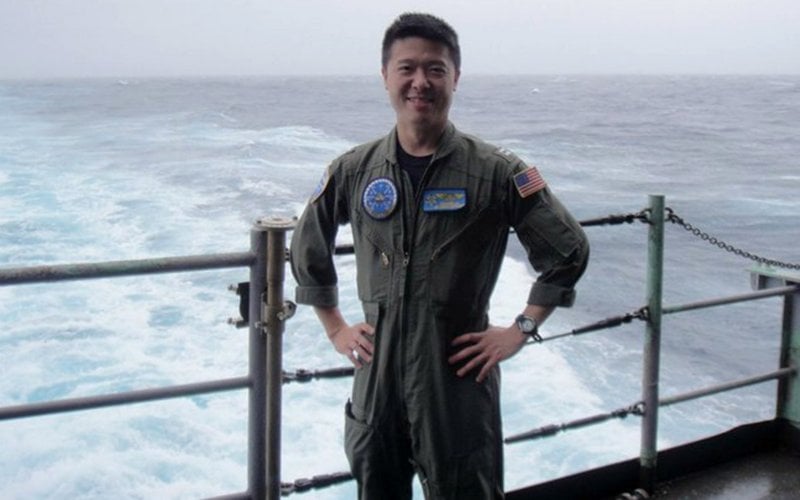
The investigation into a naval flight officer suspected of giving secrets to China and Taiwan triggered a potential national security incident alert to senior leadership in the Navy and Pentagon, two Navy officials confirmed to USNI News late Tuesday.
Lt. Cmdr. Edward Chieh-Liang Lin, 39, was quietly detained in September from his duty station as a department head assigned to the Navy’s secretive Special Projects Patrol Squadron Two ‘Wizards’ (VPU-2) at Marine Corps Air Base Kaneohe, Hawaii, and has been held at the Naval Consolidated Brig in Chesapeake, Va., under pre-trial confinement since.
Three months later, in December, Pentagon and Navy leadership received an incident alert that classified information could have been compromised, the two officials confirmed.
The alert likely stemmed from a requirement outlined in the Navy’s Office of the Judge Advocate General handbook for litigating national security cases.
According to the handbook, OJAG’s National Security and Intelligence Law Division “is required to notify the Department of the Navy General Counsel (DON GC) if serious disciplinary action is being contemplated with respect to compromise of classified information.
Additionally, [the National Security and Intelligence Law Division] is responsible to ensure that the Secretary of the Navy and the [Chief of Naval Operations] or the Commandant of the Marine Corps, as appropriate, are kept advised of the status of such cases.”
In addition to Navy leadership, the House and Senate armed services committees were also notified when Lin was initially detained in September, committee sources told USNI News on Tuesday.
The committees were “informed of the allegations against [Lt. Cmdr.] Edward Lin prior to his placement in pre-trial confinement,” a source on the Senate Armed Services Committee told USNI News.
While the Navy has not released details of the case beyond a heavily redacted list of charges, defense officials did tell USNI News on Friday that the investigation was being conducted by NCIS and the FBI.
Lin served in one of the Navy’s most sensitive signals and electronic intelligence reconnaissance units responsible for – in part — ascertaining the strengths and weaknesses of the defense systems of potential adversaries, particularly China and Russia.
Likely due to the sensitivity of what Lin could have allegedly shared with China and Taiwan, the case was has been designated a “National Security Case,” which is tried with an additional set of rules above those of normal courts-martial due to the sensitivity of the evidence involved in the proceedings.
The combination of Lin’s extended pre-trial confinement – which would have been reviewed several times before his Friday Article 32 hearing under military law– and the alerts to Navy leadership, the Pentagon and Congress may indicate prosecutors believe that Lin was able to pass classified information to a foreign government.
However, the question remains why the Navy is handling the case rather than the Department of Justice, which has more experience and resources in prosecuting national security cases.
The DoJ and the Pentagon have a 1984 memorandum of understanding outlining which cases each prosecutes. Under Navy rules, in respect to the DoJ MOU, 72 hours after a preliminary investigation suggests an act of espionage occurred, the NCIS is required to notify the relevant government investigative agency – in this case, the FBI.
The unusual length of Lin’s eight-month-long pretrial confinement could be one reason the Navy took the lead on Lin’s case over the DoJ, Rob “Butch” Bracknell, a former Marine and military lawyer, told USNI News.
“One could be they wanted to incapacitate this guy and keep them from continuing to communicate with the foreign power. If he’s indicted and arrested, he would probably be released on bail in the federal system,” Bracknell said.
“In a civil law system there’s a presumption for bail; conversely in the military system there’s a very low showing required to keep someone in pretrial confinement.”
Military jurors are could be more likely to understand the technical aspects of the evidence and already have the clearance to view classified information, he said. Also, military law can stack additional charges that don’t exist in federal court – like the Navy’s allegations that Lin committed adultery and paid for prostitutes.
Additionally, Bracknell said a military proceeding would be easier than a federal trial for “public messaging.”
“The military probably can also place greater restraints on the media and control the public messaging better,” he said.
“That’s not a flattering aspect of the military system, but it’s true.”
Following last Friday’s Article 32 hearing, Adm. Phil Davidson – the head of U.S. Fleet Forces Command – will review the case and decide whether or not to take the case to court-martial.





